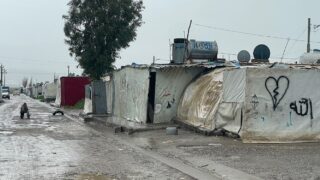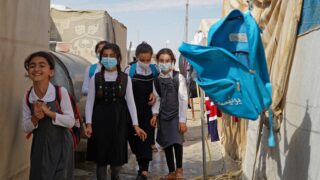" This file was produced as part of the activities of the Independent Media Network on the Arab World. This regional cooperation brings together Maghreb Emergent, Assafir Al-Arabi, Mada Masr, Babelmed, Mashallah News, Nawaat, 7iber and Orient XXI."
Mizar Kemal*
Six months before consulting a private psychiatric clinic in Baghdad, 32- year old Fatima had no clue that she was suffering from severe depression and a combination of other mental disorders. From being the subject of the bullying of her own family members and society, to the harrowing experience of being yelled at, beaten, and scorched during a “Sheikh’s” attempt to “exorcise the devil” from her body, and even through her experience of enduring her father’s threats to dump her at the ‘Shammaeyeh’ if she fails to “come to her senses”, Fatima had suffered immensely in every phase of her arduous journey to treatment.
‘Shammaeyeh’ is the colloquial, derogatory name of Al-Rashad Institute for Psychological and Mental Disorders, also commonly known as the “mental asylum”. “My father used to threaten me with the ‘Shammaeyeh’. He would tell me that no one would want to marry me… that I would become a burden to our family”, she says. If it weren’t for Fatima’s older brother and his openness to the idea of therapy, she would have never been able to escape the cycle of archaic beliefs and traditions that labelled all mental health issues as “insanity”.
Iraqi society has a general intolerance toward mental health issues. Patients are readily stigmatized, often branded as ‘insane’ or, in best case scenarios, ‘possessed’ individuals who must be taken to the Sheikh for a ‘Roqyah’ -- a specific recitation of Quranic verses, prayers, and incantations -- in addition to subjecting individuals to pain through humiliation, beatings, and scorching in various areas of the body believed to facilitate “exorcism” of a Jinn, as was experienced by Fatima. Top of Form
The unseen wounds of war
For over 40 years, Iraq has experienced back to back wars. The last four decades have seen four major wars in the country, including a 13-year-long embargo and civil strife in various regions, the most brutal of which was the sectarian war of 2006-2007.
Beside the scores of victims killed, wounded, and disabled, the immense destruction in infrastructure, and the losses in state resources and wealth at every level, other devastating, ongoing repercussions and “side effects” have emerged from all these losses, namely the psychological effects that sprawl across Iraqi society.
Iraq allocates merely 2% of its health sector’s budget to mental health, while the health sector itself receives no more than 5% of the three-year public budget (for the years 2023, 2024, and 2025). Despite the fact that, according to the World Health Organization (WHO), every 1 USD invested in scaling up treatment of common mental disorders, such as depression and anxiety, yields a 5 USD return in improved health and ability to work, Iraq falls short from advancing this sector.
Iraqi citizens pay at least 20% of the costs of their mental health care, but these costs are a burden that the poor and disadvantaged classes cannot bear. There are more than 11 million Iraqis living below the poverty line, in addition to 6 million orphans and two million widows, according to data from the Iraqi Ministry of Planning.
While the median global number of health care workers is approximately 9 per 100,000 people, that rate in Iraq dwindles to less than 2 per 100,000 people, a third of whom are non-specialists, which indicates a severe shortage in the numbers of psychiatrists, therapists, and health care workers.
In a 2004 poll by Gallup, Iraqis shared answers about their greatest hopes and fears. Their greatest hope, by far, was for security and stability (47%), while their biggest fear for the future was sectarian conflict and civil war (28%). Indeed, Iraqis’ worst fears have come true. Sectarian violence raged, triggering far-reaching repercussions in the form of security, economic, social, and health crises. A Gallup index of global sentiment ranks Iraq as the third least happy country, behind Afghanistan and Lebanon.
Iraqi citizens pay at least 20% of the costs of their mental health care, but these costs are a burden that the poor and disadvantaged classes cannot bear. There are more than 11 million Iraqis living below the poverty line, in addition to 6 million orphans and two million widows, according to data from the Iraqi Ministry of Planning.
Shammaeyeh: “Hey, hey, nutcase!”
In Iraq, which has a population of about 43 million people, there are only three hospitals specialized in mental and psychiatric disorders: Al-Rashad and Ibn Rushd Psychiatric Hospitals in Baghdad, and Soz Mental Health Hospital in Sulaymaniyah. These facilities suffer from neglect, medical staff shortage, and shortages in necessary medications.
A large portion of inpatients have been there for over 40 years and counting, even though their clinical conditions no longer require that they stay. The head of the Parliament's Health Committee has previously revealed that there are 600 patients whose families refuse to discharge them, even though they no longer need to remain, going as far as paying bribes to keep them in what many refer to as “the nuthouse”.
Some explanations for the families’ decision to keep their inpatient relatives hospitalized include the social stigmatization of mental health issues, the difficulties of societal reintegration, and the lack of residential facilities equipped to provide the necessary comfort and care for these individuals following their treatment journeys. As patients have no alternatives to the hospitals for treatment, admission to Al-Rashad Hospital, for instance, effectively becomes a permanent label of “insanity” and a lifelong sentence to institutionalization.
According to the Iraqi Ministry of Health, mental health issues are the primary causes of suicide: “43% of suicide attempts result from psychological reasons, 35% from family reasons, 15% from economic reasons, and 8% from other reasons.”
>The WHO recommends increased community-based mental health in Iraq, prioritizing the transition from psychiatric hospital-based services to community-based mental health services to facilitate the absorption of the large number of people who need therapy, and later reintegration into their families and the community, through the local health facilities towns and cities.
Ommetaphobia: The Gouged Eyed of Childhood
24-09-2023
We Waited for “The Matrix” to Fill Our World with Justice
29-09-2023
The Generation of Loss
19-09-2023
Al-Rashad Hospital is proof a wider governmental and societal neglect of mental health and of the people struggling with mental illness and trying to reclaim their lives. Following a visit to Al-Rashad Hospital in June 2023, the Parliamentary Health Committee submitted a detailed report on the hospital’s and patients’ conditions. One MP and member of the committee shared some of the report’s chilling details, including information about female patients in the hospital who were subjected to physical violence and patients who were living in rooms that lacked any kind of lighting. Additionally, 80% of all ventilation and air conditioning systems were down at the hospital, and more than 160 air conditioning devices and one million litres of the kerosene necessary to generate power at the hospital all were “missing”. These conditions persist despite the fact that Al-Rashad Hospital notably receives one of the largest financial allocations for a hospital affiliated with the Ministry of Health in Iraq, with more than 400 million Iraqi dinars annually.
>In the years leading up to the US invasion of Iraq, Al-Rashad Hospital was already in a dire state. In fact, the hospital had garnered its bad reputation during that time, marked by the circulation of various bizarre myths and spooky tales about its inpatients. With the fall of the regime and the ensuing chaos following the invasion, the hospital had its fair share of looting and arson, like most other state institutions that were the subjects of similar attacks. Iraqis cynically called these events “Al-Hawasim” (meaning “the great looting battles”), to refer to the rampant stealing, looting, and pandemonium that accompanied the invasion. During these assaults, the hospital's furniture was plundered, staff members and patients were assaulted, and several horrifying cases of rape involving female patients were reported.
Stigma and its consequences
Stigmatization and the deliberate negligence of mental health by both the state and society have exacerbated the shortage in the much-needed specialized mental health personnel. Medical trends in Iraq rarely lean toward this field due to stigma and the low financial returns for specialized medical professionals, especially with the presence of the “Sheikhs”, who not only compete with specialists but also seem to have greater influence on society than academics. Despite being aware of the facts, the state fails to alter this grim reality, and instead, it continues to license satellite channels that broadcast Jinn exorcisms and depression recovery sessions live on air.
There are too many sheikhs in Iraq and very few psychiatric clinics. Outside the capital, Baghdad, mental health facilities are limited to auxiliary clinics in the central hospitals in cities, usually called the “Mental Health Division”. Due to the scarcity of specialized mental health workers in the country, this division is managed by “social researchers” instead, who follow up on patient’s cases and supervise their files.
The Ministry of Interior’s 2023 report states that 144 international drug traffickers were arrested in Iraq, while more than 19,000 defendants were detained, with verdicts issued against more than 10,000 of them. In addition, 4 tons of narcotic substances, 15 tons of psychoactive drugs, 1,700 firearms and ammunition, and 1,200 drug transport vehicle have been confiscated.
Starting in 2014, the residents of Al-Anbar, Saladin, and Nineveh governorates suffered harsh conditions with ISIS taking control of their regions, causing immense destruction and the displacement of more than five million people. Following these events, the University of Anbar conducted a study in 2018 on Post-Traumatic Stress Disorder (PTSD) among students returning from displacement. The study showed that 25% of the students suffered from acute PTSD, 8% suffered from chronic PTSD, and 5% suffered from delayed onset PTSD.
The symptoms of war do not simply disappear when the displaced leave the camps and return home. The effects leave long-lasting scars and cannot be considered “temporary symptoms” that end with a ceasefire. In 2018, a year after the conclusion of the battles between the Iraqi security forces and ISIS, there were still more than 2.5 million Iraqis displaced in various refugee camps, 30% of whom suffer from psychological disorders, such as panic attacks, stress, PTSD and anxiety disorders that may lead to suicide.
Suicide: the fatal consequence
At a grand event at the Babylon Hotel, the Iraqi Prime Minister's Office celebrated the launching of the so-called “National Suicide Prevention Strategy” in the presence of the Minister of Health and several government officials. At the event, the Minister of Health stated in a strangely-worded sentence that “the strategy was developed to develop a suicide prevention strategy.” However, neither of the two strategies he mentioned in his word salad has been disclosed in detail yet.
Launching a suicide prevention strategy coincided with the Ministry of Interior’s publication of annual suicide data in the period 2017-2022, which revealed: 449 suicide cases in 2017, 519 cases in 2018, 588 cases in 2019, 644 cases in 2020, 863 cases in 2021, and 1,073 cases in 2022.
For the year 2023, no suicide statistics have been released yet by any of the relevant Iraqi official bodies. Meanwhile, the spokesperson for the former Iraqi High Commission for Human Rights (IHCHR) has disputed the earlier official numbers, arguing that “the statistics announced regarding deaths by suicide are much lower than the real numbers.” According to the Iraqi Ministry of Health, mental health issues are the primary causes of suicide: “43% of suicide attempts result from psychological reasons, 35% from family reasons, 15% from economic reasons, and 8% from other reasons.”
Addressing mental health problems and suicide rates entails considering factors such as poverty, unemployment, and drugs. According to a Ministry of Planning spokesman, poverty rates in Iraq, until 2023, have ranged between 20 to 21%. This percentage inevitably reflects significant unemployment rates, which reach 35% among the youth, according to the United Nations World Food Program (WFP).
The WFP’s numbers regarding poverty rates differ from those of the Ministry of Planning. The WFP claims that poverty rates have risen since 2018, “by 12.27 million people out of a population of 41.2 million, 70% of whom are young people.” Iraq’s population today, according to the Central Statistics Organization (CSO) in the Iraqi Ministry of Planning, stands at 43 million people.
These statistics raise interest in a shift of focus towards the numbers related to drug use in Iraq, described by the Iraqi National Security Advisor as the “number one threat to Iraqi society”, preceding even the threat of ISIS.
The Ministry of Interior’s 2023 report states that 144 international drug traffickers were arrested in Iraq, while more than 19,000 defendants were detained, with verdicts issued against more than 10,000 of them. In addition, 4 tons of narcotic substances, 15 tons of psychoactive drugs, 1,700 firearms and ammunition, and 1,200 drug transport vehicle have been confiscated, according to the same report.
Crystal meth, or methamphetamine, locally known as “Shabbu”, in addition to Captagon, are some of the most popular and widely consumed types of drugs in Iraq. In recent years, enormous quantities of crystal meth and Captagon have been seized, as the country has turned from a drug corridor into a drug manufacturing and consumption zone. In July 2023, Iraqi police raided a Captagon production factory in Muthanna Governorate in southern Iraq, where drug trafficking has become an extremely lucrative trade with an estimated value of around ten billion dollars annually.
When it comes to overall mental health in Iraq, these staggering numbers, which climb over the rates of poverty and unemployment, and the tons of drugs (that we know of, and that the police were able to seize) all paint a bleak picture of a people living through a terrifying collective nightmare. Wars are the main force feeding this nightmare with all sorts of horrific images of a society in which the money spent on weapons is three times the sums allocated to public health. Of this already scarce amount, an even smaller portion is allocated to mental health facilities and mental health care.
In 2005, Mental Health Law No. 1 was issued in Iraq to no real positive societal impact. In September 2023, Iraqi Parliament made a first reading of the new draft mental health law, but the law has been viewed by none other than the government and Parliament. The Minister of Health has ascertained that this law would do justice to the admittedly understaffed mental health workers in the country.
Death is a Woman from Şingal
05-06-2024
However, the major challenge facing the implementation of mental health laws lies in acknowledging the problem and understanding its underlying causes. This requires a new form of institutional and social awareness – one that is accepting and supportive of individuals grappling with mental health issues, rather than hostile and stigmatizing towards patients and those courageously battling the weight of mental and psychological crises.
*Writer and journalist from Iraq
Translated from arabic by Sabah Jalloul








